Efficiency in logistics refers to optimizing processes and resources to achieve the desired outcomes with minimal waste of time, effort, and resources. It involves streamlining operations, reducing unnecessary steps, and maximizing the use of available assets to achieve cost-effective results.
In the realm of Global Trade, reliability signifies the steadfast fulfillment of commitments and promises concerning delivery times, quality, and overall service. Building trust with customers and partners, reliability becomes the cornerstone for ensuring seamless operations throughout the entire supply chain.
Adaptability is crucial in Global Trade, requiring the ability to respond to changing circumstances like market shifts, unforeseen disruptions, and fluctuating demand. A flexible logistics system can swiftly adjust routes, modes, and plans, accommodating changes while minimizing disruptions.
The success of logistics hinges on efficient coordination among various stakeholders, including suppliers, carriers, warehouses, and customers. Well-coordinated efforts guarantee a seamless flow of goods through the supply chain, minimizing bottlenecks and delays.
Efficient trade management entails cost control without compromising service quality. This involves optimizing routes, minimizing storage expenses, and finding ways to operate efficiently while keeping expenses in check.
Lean trade is a strategic approach that emphasizes the implementation of streamlined and efficient processes within the realm of trading and supply chain operations. It revolves around minimizing waste, reducing unnecessary costs, and optimizing every aspect of the trade process to enhance overall productivity. By adopting lean principles, organizations can strive for greater agility, responsiveness, and cost-effectiveness, ultimately creating a more competitive and sustainable trade ecosystem.

Global trades epitomize the intricate web of cross-border interactions involving the exchange of goods, services, and capital on a worldwide scale. This multifaceted landscape demands astute navigation through diverse markets, regulatory frameworks, and cultural nuances. Successful global trades hinge on establishing and sustaining mutually beneficial relationships between entities, transcending geographical boundaries. Amidst the complexities, strategic planning, risk management, and a deep understanding of global markets become essential components for organizations aiming to thrive in the dynamic and interconnected realm of international commerce.

Global Trade projects assume a pivotal role in optimizing supply chain processes, elevating customer satisfaction, and propelling business growth. The triumph of these projects hinges on meticulous planning, efficient execution, and a steadfast commitment to continual improvement. By strategically aligning with global trade initiatives, organizations can navigate the complexities of international commerce, capitalize on emerging opportunities, and fortify their position in the global marketplace.








©2010-2024 GEE2 GROUP – United Kingdom | Design by Gramen